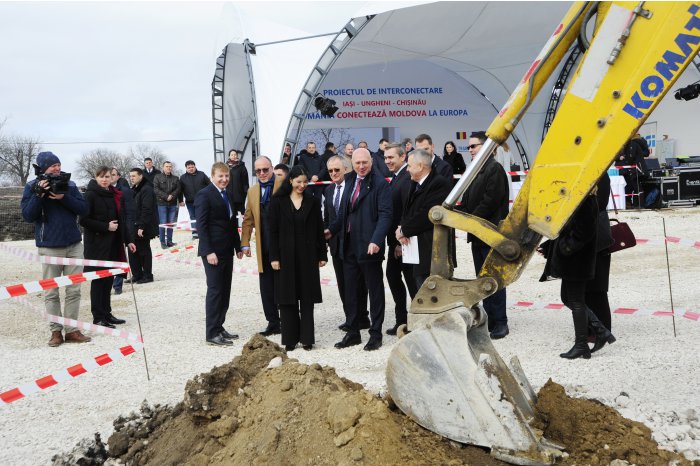19 February 2019. Construction of second segment of Iasi-Ungheni-Chisinau gas pipeline starts
11:51 | 04.02.2021 Category:
Moldova’s energy security has permanently been a sensible subject for our state. This fact was strikingly proved during the conflict in the country’s eastern districts. During more days, Russia in the spring-summer of 1992 interrupted the supplies of natural gas and electric energy. Years followed when the natural gas was a blackmail instrument. When president Voronin refused to sign the Kozak plan, which was providing for Moldova’s federalization, the Russian gas price sharply started to increase. The communist governance, which declared the European integration as priority, for the first time ever tackled the need to diversify the energy sources.
After years of explorations and procrastinations, Moldova’s negotiations with Romania on starting the construction of the Iasi-Ungheni-Chisinau gas pipeline were finished. This pipeline was to interconnect the gas networks from Romania and Moldova, providing our country access to the European energy market. Sixteen km of gas pipeline were to be built on the Romanian side and 11 km – on the territory of Moldova, as well as a segment of sub-crossing the Prut river of 700 metres. The first segment of the gas pipeline was expected to have a capacity of 500 million cubic metres and the second segment came next with a maximal capacity of 1.5 billion cubic metres of gas. This quantity was covering the gas needs of Moldova. The works started on 27 August 2013 and the gas pipeline Iasi-Ungheni was inaugurated on 27 August 2014 – the first part of the project.
The construction of the second and the most important segment, Ungheni-Chisinau, with a length of 120 km, started on 19 February 2019. From the very beginning, the Transgaz National Gas Transport Operator of Romania was in charge of the gas pipeline’s construction and functionality. As of 2018, Transgaz has owned the state enterprise Vestmoldtransgaz from Moldova through the Eurotransgaz Company. Namely this company manages the entire gas pipeline Iasi-Chisinau.
The appearance of financial problems stimulated Transgaz to sell 25 per cent of its stocks from Vestmoldtransgaz to the European Bank for Reconstruction and Development (EBRD) in early October. The decision was approved at the General Assembly of shareholders on 5 October.
„We believe that this is a profitable, reasonable, as well as strategic investment for Moldova. The gas pipeline will enhance Moldova’s energy security, due to the diversification of the gas supply sources, which represents one of the conditions for Moldova’s successful development. The project facilitates Moldova’s integration in the future big gas infrastructure projects, such as the Trans-Adriatic Gas Pipeline, opens access to gas sources from the central European knots; at the same time, it connects to gas deposits from the Black Sea. A much closer integration will bring additional economic advantages to consumers,’’ EBRD said, stressing the advantages of its cooperation in the case of the construction of the Ungheni-Chisinau segment of the pipeline.
The European Union has always supported Moldova in its efforts to enhance the security of supply with energy, both gas and electric energy. EU allocated a grant worth seven million euros for the construction of the first phase of the project – the Iasi-Ungheni pipeline, besides the project’s overall value of 26 million euros. Also, the assistance was expressed in the financing of a feasibility study for the next stage of the project – construction of a branch from Ungheni to Chisinau. The European Commission provided grants – 46.3 million euros – for the construction of the gas pipeline Onesti-Gheraesti-Letcani in Romania within the Big Infrastructure operational programme. This helped considerably increase the capacity of Iasi-Ungheni-Chisinau gas pipeline up to 1.5 billion cubic metres per year, which fully meets Moldova’s needs. The overall value of the investments for the interconnection on the side of Romania is of more than 174 million euros. An additional increase of the capacity is planned for October 2021, when another compression station was put into operation in Onesti. The total capacity will grow to 2.2 billion cubic metres per year.
The Iasi-Ungheni-Chisinau gas pipeline was finished in early August 2020. The inauguration was planned for 27 August, the Independence Day. Moldova’s Prime Minister Ion Chicu made an invitation to his Romanian counterpart Ludovic Orban to attend the inauguration; yet, for unknown reasons, this action was cancelled.
The building of this gas pipeline is of essential importance for Moldova, as it provides alternative to the gas from Russia, which has been reaching Moldova only via Ukraine so far. If the strategic gas pipelines Nord-Stream-2 and Turkish Stream are put into operation, then Russia can easily avoid the transit of gas through Ukraine, with which it is in conflict, which will impose Moldova to use the Iasi-Ungheni-Chisinau gas pipeline at the maximal capacity.
The Iasi-Ungheni-Chisinau pipeline can provide Moldova with gas from Caspian Sea, North Sea, Northern Greece and Norway. This possibility has not been fulfilled as yet; the contract for the 2020-2021 winter season was signed only with Gazprom.
Through finishing the construction and ensuring the functionality of the Iasi-Ungheni-Chisinau gas pipeline, Moldova made a huge step in its connection to the European energy market, a stable and non-politicized one. Moldova has proved its political will and sincerity in its European approach.

